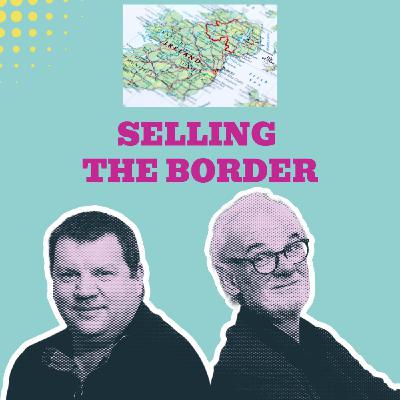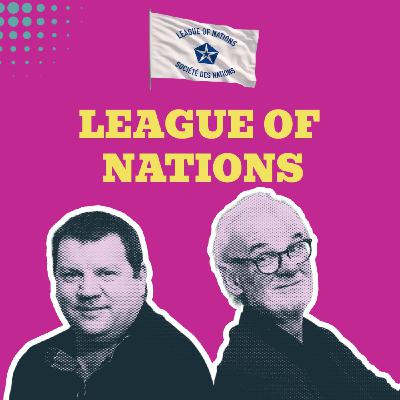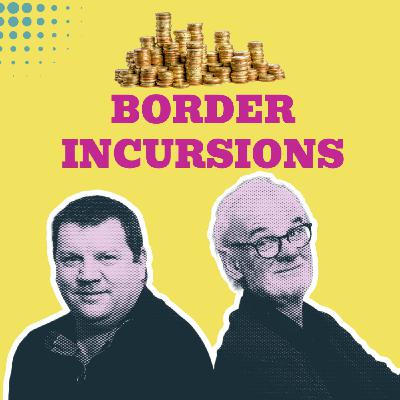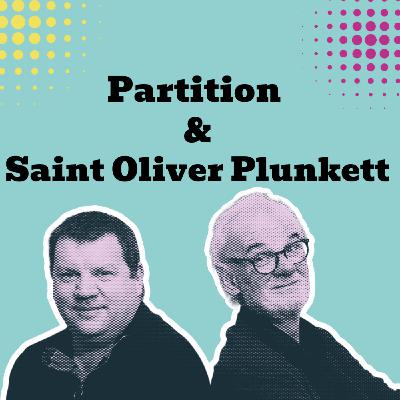Discover The Irish History Boys
The Irish History Boys

The Irish History Boys
Author: The Irish History Boys
Subscribed: 98Played: 3,026Subscribe
Share
© The Irish History Boys
Description
Comedian Tim McGarry and Historian Cormac Moore select the stories from the archives of The Irish News that bring Irish history to life in enlightening and amusing ways.
Hosted on Acast. See acast.com/privacy for more information.
48 Episodes
Reverse
In this episode of the Irish History Boys, Tim McGarry and Dr. Cormac Moore reflect on the "obituary" of the 1975–1976 Constitutional Convention, a failed British attempt to find a political solution that instead left Northern Ireland in a "complete political vacuum". We examine how the refusal of unionists to share power led to a period of "violence and stagnation," with 1976 becoming one of the bloodiest years of the Troubles. We also dive into the financial "insolvency" of Northern Ireland, tracing it back to 1926 when the statelet first required a "free gift" from the British Treasury to avoid bankruptcy and pay unemployment benefits. We discuss the myth of the North as a self-sustaining industrial powerhouse and reveal how it has evolved into the highest per-head drain on UK resources, now costing an estimated £14 billion a year. Additionally, we explore the social and legislative landscape of the mid-70s, from the introduction of sex discrimination laws to the "watered down" Fair Employment Act of 1975. We also discuss the historical "security lapse" of 1981, where the IRA came remarkably close to assassinating the Queen during a visit to the Shetland Islands. To conclude, we tackle the modern-day debate over a United Ireland, questioning whether the British truly want to leave and if the Republic of Ireland is prepared to inherit a "partition statelet" that has never truly paid its own way. Hosted on Acast. See acast.com/privacy for more information.
In this episode of the Irish History Boys, we reflect on the barbaric 1976 murders of Mary Sloan, May Sloan, and Doris McGrath—a tragedy described at the time as a "new low in barbarity". We examine these senseless killings within the context of 1976's grim violence and the ways in which such horrific events were often "hazed over" by the relentless cycle of conflict during the Troubles.Additionally, we explore the Irish Free State's struggle to "unshackle" itself from the British judicial yoke in 1926. We discuss the debate over judges’ wigs and gowns as a symbol of burgeoning statehood and the tension between adopting the inherited British system versus the more egalitarian, indigenous Dáil court system.To conclude, we tackle the "moral panic" of the 1920s, examining how both Catholic and Protestant leaders waged a social crusade against the perceived evils of jazz, modern dancing, and "evil literature". We also address 1926 proposals for border tolls on heavy lorries, highlighting how economic disputes further cemented the reality of partition. Hosted on Acast. See acast.com/privacy for more information.
In this episode of the Irish History Boys, we commemorate the 50th anniversary of Frank Stagg’s 1976 hunger strike—a 60-day ordeal that ended in a "cloud of controversy" and left his family deeply divided. We examine the harrowing physiological toll of the strike and the Irish government's extraordinary tactical decision to intercept Stagg's remains via helicopter to prevent the IRA from achieving a "propaganda coup".Additionally, we travel back 100 years to 1926 to analyze the "splenetic denunciation" of the Irish Free State by the Unionist press. We discuss how the Irish News exposed this as a "political trick" used by leaders to distract their own public from domestic grievances by focusing on the "business worries" of their neighbours.To conclude, we address the international stage of the mid-1920s, specifically Benito Mussolini’s aggressive "Italianization" of South Tyrol. We examine his defiant stance against the "toothless" League of Nations, a bold assertion of power that signaled the darkening political climate of early 20th-century Europe. Hosted on Acast. See acast.com/privacy for more information.
In this episode of the Irish History Boys, we examine the poignant death and funeral of Anthony Reavy in 1976—the third brother in one family to perish following a loyalist shooting. We place this tragedy within the broader context of the era's relentless sectarian violence and the prevailing "political vacuum" of the time.Additionally, we highlight the growth of indigenous Irish commercial entities, such as IPB Insurance, as symbols of burgeoning statehood and the drive to move away from British-run systems.To conclude, we address a listener's strategic question regarding the partition of Ireland: specifically, whether the unionists' decision to secure six counties instead of four ultimately created the demographic conditions for a future reunification. Hosted on Acast. See acast.com/privacy for more information.
his week we explore the fallout of the tripartite agreement of 1926, which led to the release of 33 political prisoners in Northern Ireland—though three "Derry prisoners" remained behind bars due to their roles in a fatal rescue attempt. We examine how political status served as a recurring bargaining chip, tracing the history of Republican resistance from the 1918 "German Plot" to the daring escapes of the Civil War.Finally, we discuss the harrowing death of hunger striker Frank Stagg in 1976 and the British government's "callous" refusal to grant him a transfer to a Northern Irish prison. We also look at the Irish government's extraordinary measures to prevent a Republican funeral, including the use of helicopters and concrete to secure his final resting place against his family's wishes Hosted on Acast. See acast.com/privacy for more information.
This week we explore the pivotal year of 1926 for the Gaelic Athletic Association, as delegates from Louth and Tipperary pushed for the removal of the compulsory ban on "foreign games" such as soccer, rugby, cricket, and hockey. We look at the systemic issues regarding the enforcement of these rules, including the 1938 removal of Ireland's first president, Douglas Hyde, as GAA patron and the deployment of vigilante committees to ensure members did not attend rival sporting events. We also discuss why Northern members were the strongest advocates for maintaining these bans, as they felt abandoned by the Free State and faced continued obstruction and British rule within the six counties. Finally, we chat about the controversial "bandit country" label applied to South Armagh in the 1970s, while examining a local citizen’s poignant letter protesting the "blackening" of their peace-loving community’s name. Hosted on Acast. See acast.com/privacy for more information.
Tim McGarry and Dr Cormac look back at the significant news stories of 1926 and 1976. Regarding 1926, they explore the complexities of the cross-channel postal service and the unionist desire for a "red route" to bypass the Irish Free State, highlighting Northern Ireland's unique status as a "polity". They also examine the legacy of the Belfast boycott—a counterproductive campaign that may have accelerated the start of the Civil War—and a prophetic letter to the Irish News bemoaning the "lost art of conversation" in the face of new technologies like radio and cinema.Moving to 1976, they reflect on a "bleak and miserable" period defined by "pure evil" and a "total political vacuum" following the collapse of the Sunningdale agreement. They delve into the horrific sectarian atrocities in South Armagh, specifically the Reevy and O'Dowd family murders and the retaliatory Kingsmill massacre. The hosts discuss the long-term impact on survivors like Alan Black, the lack of formal inquests, and the unsettling questions regarding potential British collusion and the mysterious role of Robert Nairac. Hosted on Acast. See acast.com/privacy for more information.
Tim McGarry and Dr Cormac look back at the significant news stories of 1925 and 1975. Regarding 1925, they delve into the Boundary Commission, which established the permanent border of Northern Ireland and was seen as a "triumph for unionism" under James Craig, alongside social issues like the emancipation of women smoking in public and a largely "forgotten" famine in the West of Ireland. Moving to 1975, they reflect on a "miserable year" defined by a political vacuum, horrific sectarian violence such as the Miami Showband murders, and the unexpected political conversion of hardliner William Craig to the idea of power-sharing. Hosted on Acast. See acast.com/privacy for more information.
This week we explore the pivotal moment for Northern Catholics following the 1925 London Agreement, which firmly established the six-county border and left many feeling "stuck" and abandoned by the Free State. We look at the systemic issues that followed, including the "factory of grievances" born from gerrymandering, the removal of Proportional Representation, and the stark lack of Catholic representation in the judiciary and civil service. We also chat about the staggering unemployment figures of 1975 in border areas like Strabane and Newry, while answering a listener’s question regarding the Troubles' impact on Scotland Hosted on Acast. See acast.com/privacy for more information.
This week we explore the controversial legacy of the Ulster Special Constabulary, tracing its 1920 origins as a multi-tiered force. We look at the the group's involvement in sectarian violence and the subsequent disbandment of the A and C Specials following the 1925 London Agreement, despite vocal protests from members over their severance terms. We also chat about the B Specials long-term survival until 1970, while contrasting the era’s news with the political despair felt in Northern Ireland fifty years later. Hosted on Acast. See acast.com/privacy for more information.
This week we dive into President WT Cosgrave’s reliance on neighbourly feeling rather than written guarantees for the safety of Northern Catholics and the establishment of customs barriers in 1923 and their controversial persistence for over 70 years. Illicit pig smuggling in the mid-1970s makes an appearance and Tim relives the 11-plus exam. Hosted on Acast. See acast.com/privacy for more information.
Following the leak of the Boundary Commission's report, the high-stakes Tripartite Agreement of 1925 established that the border would remain unchanged, ensuring Northern Ireland conceded no territory. In exchange for accepting the existing boundary, the Irish Free State was relieved of its crippling obligation to pay a share of the UK's imperial debt, estimated at roughly £150 million. However, W.T. Cosgrave’s government faced severe backlash and a major political crisis for prioritising this financial reprieve over the interests of Northern nationalists, who were effectively abandoned by the deal. Hosted on Acast. See acast.com/privacy for more information.
This episode centers on the crisis created by the leaked award of the Irish Boundary Commission in November 1925, which was abysmal for nationalists as it suggested the Free State would lose parts of Donegal and Monaghan, leading to the resignation of Free State Commissioner Eoin MacNeill and creating the biggest crisis Cosgrave’s government faced since the Civil War. President Cosgrave rushed to London to attend conferences with British Premier Stanley Baldwin and Northern Premier Sir James Craig, determined to bury the report because the findings were politically unacceptable, despite being in a weak negotiating position. Free State negotiators, particularly Kevin O'Higgins, leveraged the threat that their government’s collapse would result in a Republican regime to shift the negotiation focus towards shelving the boundary issue (Article 12) in exchange for waiving the Free State’s substantial financial contribution to imperial debt under Article 5. Hosted on Acast. See acast.com/privacy for more information.
This episode concentrates on the 1925 Boundary Commission crisis and its fallout for the Free State, triggered by the dramatic resignation of Free State representative Eoin MacNeill around November 22nd. We also discuss the concurrent debate among anti-Treaty Republicans, including Éamon De Valera, about whether to abandon their abstentionist policy and enter the Free State parliament amidst the political instability. Finally, we address a listener query on the distinct development of healthcare systems, particularly the role of religious hospitals, in Northern Ireland and the Free State following Partition. Hosted on Acast. See acast.com/privacy for more information.
The episode explores the immense influence of World War I on Irish history from setting the stage for the Easter Rising and War of Independence to motivating over 200,000 Irish volunteers (Catholic and Protestant) to enlist, often for economic reasons or in anticipation of Home Rule. Tim & Cormac discuss the 1918 anti-conscription campaign, which powerfully united nationalist Ireland against British rule. They also address the difficulties faced by returning veterans and the challenges confronting Protestant communities in the Free State post-partition, including antagonism and violence. Hosted on Acast. See acast.com/privacy for more information.
This episode of the Irish History Boys is dedicated to dissecting the political fallout generated by the explosive November 7th, 1925, Morning Post leak—the event described by sources as the climax of the entire Irish Boundary Commission saga.The Morning Post's forecast, initially met with skepticism, proved almost on the money, revealing that the Commission was planning only rectification on lines convenient to both sides and not at any large transfers of territory. This outcome, involving mere tiny little tinkerings with the border, was instantly recognised as a complete unionist victory.Join us as we examine how a single newspaper leak derailed the Boundary Commission and solidified partition. Hosted on Acast. See acast.com/privacy for more information.
This week, we're uncovering historical drama that still echoes today. We dig into the League of Nations, the toothless tiger whose failures against big bullies like Mussolini's Italy made people question its power—a debate still relevant when looking at the UN today. We also celebrate the Irish Free State's successful 1923 entry into the League as a massive power move to assert its independence, despite attempts by the British to shut it down. Finally, we jump ahead to 1975 to examine the end of the brutal regime of Spanish dictator Francisco Franco, who outlived all his wartime peers, before concluding with the shocking, tragic, and often forgotten 1925 story of Irish politician Darrell Figgis TD. Hosted on Acast. See acast.com/privacy for more information.
This week on The Irish History Boys, the discussion covers the controversy surrounding the Free State granting major contracts, such as the vital hydro-electric scheme on the Shannon, to foreign companies like the German firm Siemens, instead of British firms. Fast forward to 1975 and the border between North and South Ireland transformed into a security border during the Troubles, complete with physical barriers and watchtowers. Tim and Cormac detail the "grave concern at border trespass", focusing on an incident where five British soldiers crossed two miles into the Republic, allegedly raiding a farmhouse and commandeering a car while pursuing men on a tractor. Finally, the episode examines the notorious 1975 conviction of the Guildford Four—three men and a young girl—for the Guildford and Woolwich pub bombings. Judge John Johnson famously warned 21-year-old Paul Hill that "life meant life", a devastating sentence for a crime they did not commit, though their innocence was later supported when the Balcombe Street IRA gang confessed to the bombings. Hosted on Acast. See acast.com/privacy for more information.
This week, the Irish History Boys explore the messiness, the craziness and the unrealism that surrounded the Partition of Ireland. We discuss the intense speculation and rumors surrounding the Irish Boundary Commission's report in October 1925, highlighting the complications caused by duplicated services and the controversial interpretation of Article 12 that ultimately cemented the six-county border. The episode also shifts focus to the 1975 canonization of St. Oliver Plunkett, who became the first Irishman granted this honour in over 700 years. We recount the history of the Catholic Archbishop of Armagh, detailing his condemnation in a show trial and his gruesome execution in 1681 by being hanged, drawn, and quartered. Hosted on Acast. See acast.com/privacy for more information.
This episode of the Irish History Boys explores two significant and controversial events that unfolded in 1975, beginning with the curious, unsanctioned kidnapping of Dr.Tiede Herrema, a Dutch industrialist, in County Limerick by rogue IRA members.The kidnappers, led by Eddie Gallagher, sought the release of Republican prisoners like Rose Dugdale, leading to a massive, internationally covered siege.Simultaneously, an infamous trial was concluding across the water regarding the 1974 Guildford and Woolwich pub bombings. Hosted on Acast. See acast.com/privacy for more information.
























